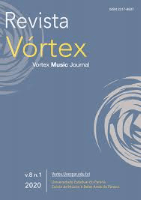
Revista Vortex-Vortex Music Journal
metrics 2024
Fostering Global Dialogues in Musicology and Performance
Introduction
Revista Vortex-Vortex Music Journal is a premier open-access journal published by the Universidade Estadual do Paraná, specifically through its esteemed Escola de Música & Belas Artes do Paraná. With its ISSN 2317-9937, this journal serves as a critical platform for the dissemination of research and discourse in the field of musicology, music education, and the performing arts. Established in 2014, the journal has been dedicated to fostering scholarly exchange among researchers, practitioners, and students, emphasizing the significance of music as a cultural artifact and academic pursuit. As an open-access publication, it ensures that findings are readily available to a global audience, promoting inclusivity and engagement in the field. Located in Curitiba, Brazil, Revista Vortex invites contributions that explore a diverse range of topics and methodologies, seeking to enhance the understanding of music in contemporary society.
Metrics 2024
 -
- 0.10
0.10 0.10
0.10 -
-Metrics History
Rank 2024
JCI (Web Of Science)
Quartile History
Similar Journals

MUSICAL TIMES
Unveiling the Cultural Dimensions of SoundMUSICAL TIMES is a distinguished journal dedicated to the exploration and dissemination of scholarly works in the realm of music, serving as an essential resource for researchers, professionals, and students alike. Published by MUSICAL TIMES PUBLICATIONS LTD, this journal has built a robust reputation within the arts and humanities, specifically focusing on music studies, with an impactful reach indicated by its Scopus ranking at #73 out of 106 in the field. Though access to this journal is not open, its curated content, which spans various facets of musicology and contemporary music discourse, enriches the academic community by encouraging insightful discussions and critical analyses. With its historical roots tracing back to its inception, MUSICAL TIMES aims to foster a deeper understanding of music's cultural, social, and artistic dimensions, making it a valued publication for those engaged in the scholarly pursuit of music.
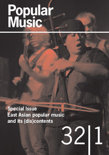
Popular Music
Unveiling the Dynamics of Popular CulturePopular Music, published by Cambridge University Press, is a leading academic journal that has been at the forefront of contemporary music studies since its inception in 1981. With its comprehensive scope encompassing a rich diversity of topics within the fields of Cultural Studies and Music, this journal holds a respectable Q2 ranking in both categories as of 2023, underscoring its significant impact on the scholarly discourse surrounding popular music. Researchers, professionals, and students alike will find invaluable insights within its pages as it explores the socio-cultural dynamics of music from various global perspectives. While it is not an open-access journal, the publication aims to foster critical dialogue and interdisciplinary scholarship. Based in the United Kingdom, Popular Music serves as a vital resource for those interested in the intersections of music, culture, and society, sustaining a vibrant academic community through rigorous peer-reviewed articles and reviews. Engage with the latest research and deepen your understanding of popular music's ever-evolving landscape.
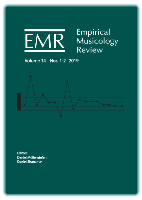
Empirical Musicology Review
Bridging Theory and Practice: Where Musicology Meets MethodologyEmpirical Musicology Review is a pioneering journal in the field of musicology, published by the Ohio State University School of Music. Established as an open access journal since 2006, it aims to foster interdisciplinary research by providing a platform for scholars to disseminate empirical studies and analyses related to music. With ISSN 1559-5749, this journal plays a crucial role in expanding the understanding of music through methodological rigor and innovative practices, catering to researchers, professionals, and students alike. By promoting the accessibility of high-quality research, Empirical Musicology Review significantly contributes to the evolving landscape of music studies and enhances the global dialogue surrounding music's theoretical and practical dimensions. The journal's commitment to open access ensures that its valuable insights reach a broad audience, encouraging further exploration and collaboration within the musicology community.

ACTA MUSICOLOGICA
Pioneering Conversations in the World of MusicologyACTA MUSICOLOGICA, published by the International Musicological Society, stands as a pivotal journal within the field of Musicology, garnering attention from scholars and practitioners alike. With its ISSN 0001-6241, the journal serves as a vital platform for innovative research and discourse from 2002 to 2013 and again from 2016 to 2024, achieving a Q2 ranking in the 2023 Music category. Reflecting a commitment to excellence, it ranks #105 out of 180 in Arts and Humanities Music according to Scopus, placing it at the 41st percentile among its peers. Although not open access, ACTA MUSICOLOGICA ensures the dissemination of significant musical research, fostering scholarly exchange and exploration. This esteemed publication is essential for researchers, professionals, and students looking to deepen their understanding of musicology and contribute to ongoing academic conversations.

FONTES ARTIS MUSICAE
Contributing to a rich legacy of music scholarship.FONTES ARTIS MUSICAE, with ISSN 0015-6191 and E-ISSN 2471-156X, is a distinguished journal published by A-R EDITIONS, specializing in the fields of Music and Library and Information Sciences. Established in the United States, this journal serves as a vital resource for scholars, practitioners, and students engaged in the exploration and analysis of music and its associated disciplines. With an established converged publication history from 2002 to 2024, FONTES ARTIS MUSICAE has consistently contributed to the discourse within its scope, reflected in its current quartile rankings of Q4 in Library and Information Sciences and Q3 in Music for 2023. Although not an open-access journal, it offers essential insights and research findings, appealing to a diverse academic audience. Its position within the 18th percentile of the Arts and Humanities (Music) category and 11th percentile in Library and Information Sciences underscores its growing significance in these fields, making it a critical platform for advancing knowledge and fostering collaboration.
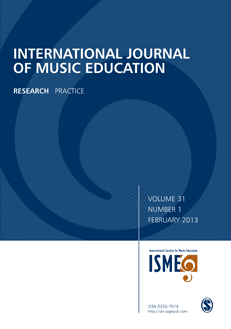
International Journal of Music Education
Championing research that resonates in classrooms worldwide.The International Journal of Music Education is a premier academic platform published by SAGE Publications Ltd, dedicated to exploring the interdisciplinary intersections of music and education. With its ISSN 0255-7614 and E-ISSN 1744-795X, this esteemed journal has been contributing significantly to the field since 1996 and will continue to do so through 2024, underscoring its commitment to advancing scholarly discourse in music pedagogy. It boasts impressive ranking metrics, including Q1 status in Music and Q2 in Education as of 2023, reflecting its influence within these domains. Ranked #10 out of 180 in Music (94th percentile) and #501 out of 1543 in Education (67th percentile) by Scopus, the journal is acknowledged for its rigorous peer-reviewed articles that address contemporary issues, innovative teaching strategies, and the role of music in learning environments. Although it does not offer open access, researchers, professionals, and students are encouraged to engage with its comprehensive research findings, ensuring the advancement of both music education and the broader arts landscape.
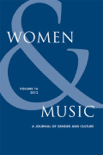
Women and Music-A Journal of Gender and Culture
Fostering Inclusive Scholarship in Gender and the ArtsWomen and Music: A Journal of Gender and Culture is a pioneering academic journal published by University of Nebraska Press, focusing on the intersection of gender and music. With a commitment to exploring issues pertinent to women and music in a range of cultural contexts, this journal provides a critical platform for scholars, musicians, and educators to share research that enriches our understanding of gender dynamics within the music industry and music's role in society. While currently not an open-access journal, it aims to make significant contributions to gender studies, cultural studies, and musicology, attracting a dedicated readership from various backgrounds. The journal is essential for those interested in feminist musicology and gender representation in the arts, fostering discourse that challenges traditional narratives and promotes inclusive scholarship. By bringing together diverse perspectives and innovative research, Women and Music continues to push boundaries and foster important conversations within both academic and artistic communities.

INTERNATIONAL REVIEW OF THE AESTHETICS AND SOCIOLOGY OF MUSIC
Transforming Perspectives on Music and Its Social FabricThe INTERNATIONAL REVIEW OF THE AESTHETICS AND SOCIOLOGY OF MUSIC, published by the Croatian Musicological Society, is a pivotal scholarly journal dedicated to the intricate intersection of music, aesthetics, and sociology. With a special focus on exploring the cultural and social dimensions of music, this journal serves as a platform for researchers, professionals, and students alike to disseminate innovative ideas and transformative research. Although it operates under a traditional access model, the journal's impact within the field of music studies is underscored by its commendable Scopus ranking in the Q3 category and its established history from 2009 to 2016, with a renewed focus from 2018 to 2023. With an ISSN of 0351-5796, it continues to shape academic discourse with its insightful contributions and is essential for those aiming to engage deeply with the evolving dynamics of music in society.

RIVISTA ITALIANA DI MUSICOLOGIA
Connecting Scholars Through the Language of MusicRIVISTA ITALIANA DI MUSICOLOGIA, published by the Italian Society of Musicology, is a distinguished journal dedicated to the field of musicology, offering a platform for scholarly research and discourse on a wide array of musical topics. With an ISSN of 0035-6867 and an E-ISSN of 2036-5586, this journal has contributed significantly to the understanding of music in cultural and historical contexts. Although the scope of coverage was marked from 2003 to 2008 in renowned databases like Scopus, the journal continues to serve as an invaluable resource for researchers, educators, and students embroiled in music studies. Its emphasis on rigorous research and critical analysis makes it a vital asset for anyone seeking to deepen their knowledge of musicological inquiry. While not an open-access publication, the RIVISTA ITALIANA DI MUSICOLOGIA remains a prestigious outlet for scholarly contributions that reach audiences eager to explore the complexities of musical heritage.

Muzikoloski Zbornik
Innovating the Study of Music Across CulturesMuzikoloski Zbornik is a prominent open-access journal in the field of musicology, published by the esteemed University of Ljubljana Press since 1965. Hailing from Slovenia, this journal has been dedicated to advancing the study of musical heritage, theory, and practice, serving as a vital platform for researchers, professionals, and students alike. With a notable Q2 category ranking in the field of music and a Scopus ranking of 109 out of 180 in Arts and Humanities, Muzikoloski Zbornik showcases high-quality research, fostering discourse and collaboration among scholars globally. The journal embraces a diverse range of topics, from ethnomusicology to music education, ensuring its relevance in an ever-evolving academic landscape. By providing unrestricted access to its content, it champions the dissemination of knowledge and supports the growth of the musicology discipline.